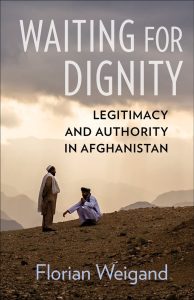In Waiting for Dignity: Legitimacy and Authority in Afghanistan, Florian Weigand examines the legitimacy of state power and other authorities in Afghanistan. Drawing on hundreds of interviews with Afghans, the book is an invaluable contribution to the understanding of politics and power in Afghanistan and to the broader field of conflict resolution studies, writes Hossein Mousavi.
You can read an essay by Florian Weigand introducing the book from 2022 here.
Waiting for Dignity: Legitimacy and Authority in Afghanistan. Florian Weigand. Columbia University Press 2022.
 The Taliban’s return to power and the withdrawal of all US troops from Afghanistan after nearly twenty years of war rank among the most startling and thought-provoking events in global politics since 2021. Waiting for Dignity by Florian Weigand is essential reading for researchers and policymakers seeking to understand the current dynamics in Afghanistan and to gain insights into the potential future outlook.
The Taliban’s return to power and the withdrawal of all US troops from Afghanistan after nearly twenty years of war rank among the most startling and thought-provoking events in global politics since 2021. Waiting for Dignity by Florian Weigand is essential reading for researchers and policymakers seeking to understand the current dynamics in Afghanistan and to gain insights into the potential future outlook.
Weigand … [claims] that both the Afghan state and international actors misinterpreted the actual political order in Afghanistan, failing to establish two key pillars commonly cited in policy literature: the monopoly of physical force and legitimacy.
With a robust research background centred on the political order of conflict zones (the author co-edited the Routledge Handbook of Smuggling) and experience as a Political Affairs Officer for the United Nations Assistance Mission in Afghanistan, Weigand makes two central claims in his book. Firstly, that both the Afghan state and international actors misinterpreted the actual political order in Afghanistan, failing to establish two key pillars commonly cited in policy literature: the monopoly of physical force and legitimacy. Secondly, echoing constructivist view, he contends that the Taliban’s growing influence was not just rooted in physical coercion; the public’s perception of them as more legitimate than the state was a significant factor. But how do the people of Afghanistan perceive legitimacy? Counterintuitively, an authority is seen as legitimate not due to the ideology it stands for, but rather because of its mode of interacting with people on a daily basis – treating them with dignity and respect.
An authority is seen as legitimate not due to the ideology it stands for, but rather because of its mode of interacting with people on a daily basis.
Through conducting 498 interviews with a diverse group of individuals, spanning differences in age, sex, income, social position and district of residence in Afghanistan, and by engaging deeply with theories of the state, Weigand enhances our understanding both of the specific context of Afghanistan and the broader field of conflict resolution studies.
In conflict-torn zones, the state is not the predominant actor; instead, the political order is influenced by the interplay of various authorities.
To construct the book’s argument, Weigand first posits that the political order in a conflict zone is not solely defined by a monopoly on physical force by a single actor, as suggested by the Weberian concept. Neither is it solely determined by a monopoly on institutional, bureaucratic, cultural, and ideological forces, as Bourdieu’s concept of the monopoly of symbolic force might imply. In conflict-torn zones, the state is not the predominant actor; instead, the political order is influenced by the interplay of various authorities. Consequently, understanding this political order requires a more dynamic theoretical framework.
Secondly, to comprehend the sources of the Taliban’s influence beyond mere coercion, the book delves into why people voluntarily obey an authority, particularly in areas that had already come under Taliban control. It employs a flexible framework to explore concepts of legitimacy empirically from the perspective of ordinary people, avoiding pre-established normative definitions of legitimacy. By distinguishing between instances when people recognise an authority’s right to exert social control due to its service delivery, and when it aligns with their beliefs and norms, he goes through the nuances in interviewees’ narratives, capturing references to an authority’s actions, services, ideologies, and longstanding traditions. Moreover, to attain as comprehensive a perspective as possible on public views, interviews with authority representatives were conducted to capture their self-perception of legitimacy. Each chapter also provides a history of the respective authority, aiding readers in contextualising the interview analyses
Four primary authorities emerged in the political landscape of Afghanistan: the state, strongmen and warlords, the Taliban, and community authorities such as elders.
From the in-depth interviews, four primary authorities emerged in the political landscape of Afghanistan: the state; strongmen and warlords; the Taliban; and community authorities such as elders. This book reveals that these authorities are not monolithic. For instance, it delves into the diverse public perceptions of distinct entities within the state apparatus, including the Afghan National Army, the Afghan National Police, Afghan Local Police, the National Directorate of Security, the judiciary and parliamentarians. The book also highlights that both the self-perception of authorities and the public’s perception of them can change and evolve over time, sometimes leading to overlaps between different authorities. For example, it traces the changing portrayal of the Taliban, from fragmented Islamist vigilantes to various non-state armed groups, and then to political dissenters combating corruption.
There is a marked difference in perceptions between urban and rural residents.
Two major patterns emerge from the interviews. Firstly, there is a marked difference in perceptions between urban and rural residents. Those in urban areas tend to view the Taliban as a threat to their security. However, both groups overwhelmingly perceive the state as corrupt and extractive. The second pattern pertains to the frequent use of words such as “listening”, “respect”, “accessibility”, and “fair” in all interviews, irrespective of the authority being discussed. This leads the author to deduce that the criterion for legitimacy in exerting social control is rooted in the mode of daily interaction with authorities that should embed people’s dignity.
The author emphasises that the focal point is on dignity and the mode of daily interaction, rather than the extent of adherence to Sharia or alignment with a particular narrative of Islam.
From this conclusion, the author emphasises that the focal point is on dignity and the mode of daily interaction, rather than the extent of adherence to Sharia or alignment with a particular narrative of Islam. However, one may shift the question from how people perceive legitimacy to how they view dignity, accessibility and the fairness of an authority’s behaviour. How can we disentangle religious and ideological narratives from people’s perceptions of “respect,” “being heard by authorities,” and “fairness”? The perspectives people hold towards elders vs. youths, male vs. female, and individual vs. collective interests cannot be isolated from religious influences, especially in the context of Islam.
In conclusion, Waiting for Dignity proves invaluable for both researchers in political and social sciences as well as policymakers. For researchers, it serves as an erudite exemplar of how theoretical frameworks should be both challenged and contextually applied. For policymakers, it offers vital insights into the extent to which public perception holds a constitutive role in shaping the political arena of a given context.
Note: This review gives the views of the author, and not the position of the LSE Review of Books blog, or of the London School of Economics and Political Science. The LSE RB blog may receive a small commission if you choose to make a purchase through the above Amazon affiliate link. This is entirely independent of the coverage of the book on LSE Review of Books.
Image Credit: Trent Inness on Shutterstock.







We must recognise after twenty years of USA precision (and no so precision) drone strikes upon hundreds and scores of individuals once constituting the Taliban (Two Students), who had successfully banned poppy production in Afghanistan to instead grow food, that the new “Taliban” is very different from their parents and grandparents. Obviously, CIA feels the new generation is so distant from their religion and ever banning poppy production again that USA can walk away and count on them to continue these un-Islamic agricultural practices to ultimately fund CIA covert operations. Under this latest form of neo-colonialism, legitimacy will be a long time coming.